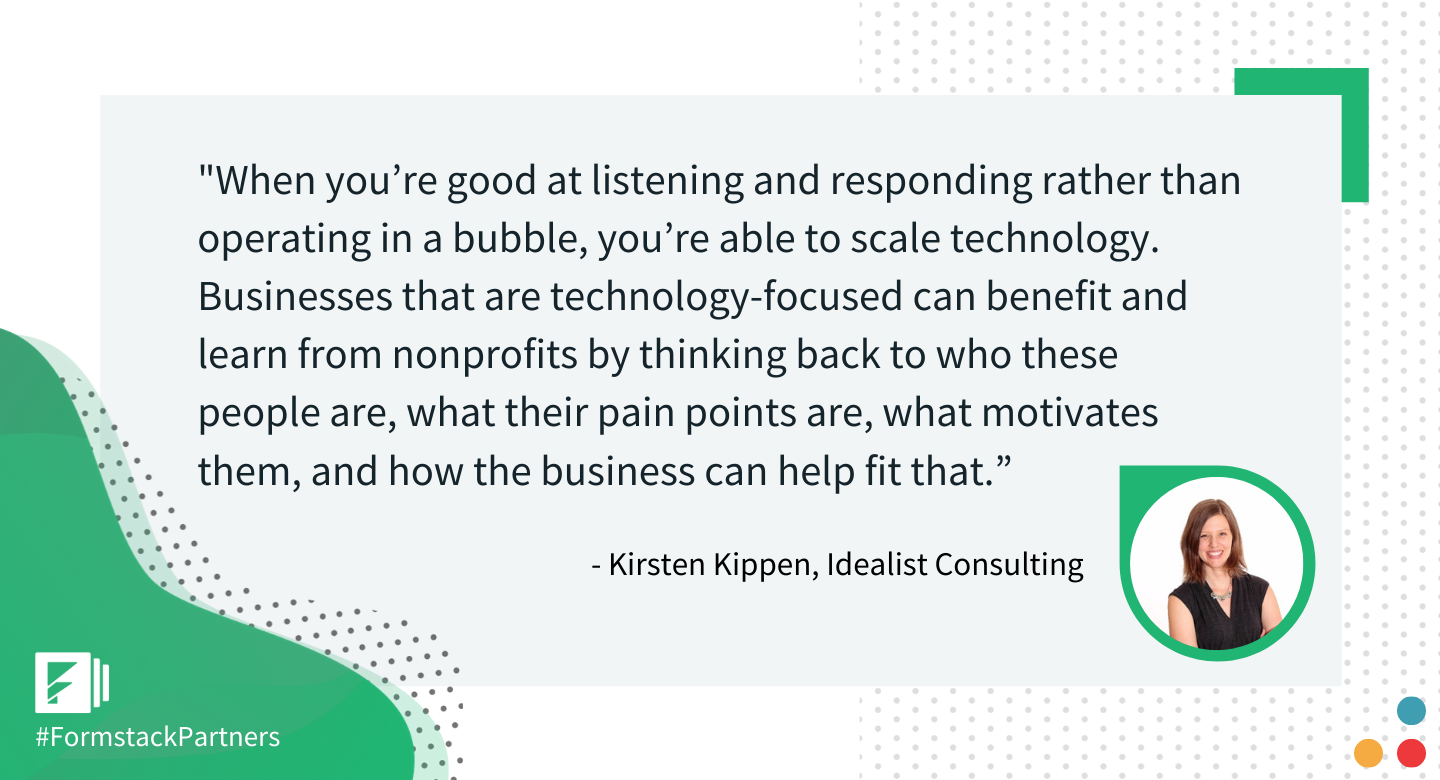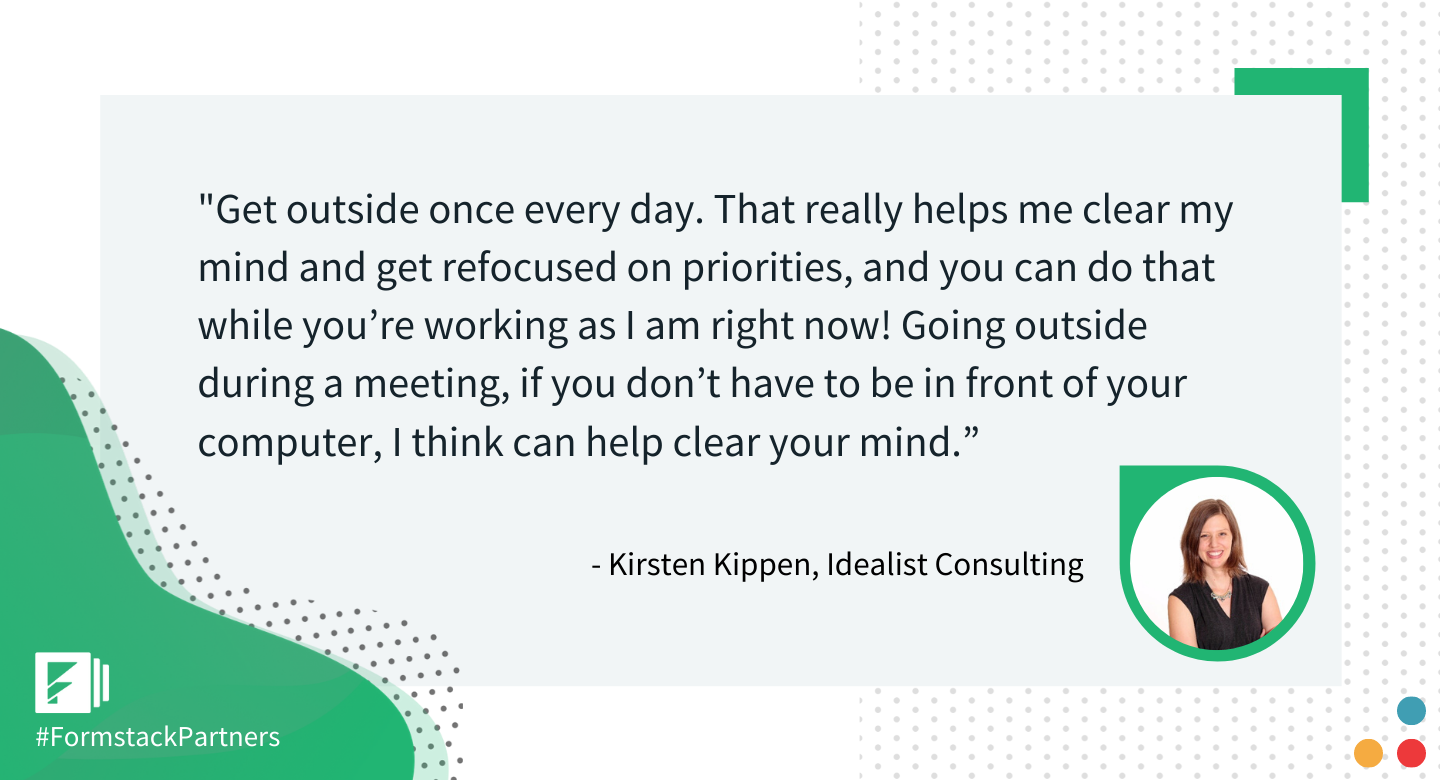Our VP of Partnerships Zak Pines sat down with Kirsten Kippen, Director of Marketing at Idealist Consulting, as part of our ongoing Partner Interview Series. Zak and Kirsten had a far-ranging conversation that covered both growth and company culture at Idealist Consulting and the parallels between nonprofit and for-profit businesses. Here’s an abridged transcript of the conversation.
Idealist Consulting Background
Zak: Thank you for participating in the partner interview series! You’ve been with Idealist Consulting for almost seven years. Have you experienced a lot of growth over that time period?
Kirsten: Yes we have. The most notable thing that comes to mind is how much the partner world of Salesforce.org has changed. We were one of the original nonprofit cloud developers back in the day, over 10 years ago.
When I joined the company, there were only about 10 other consulting partners specialized in nonprofits. Now there are hundreds. Lately, the most exciting opportunities have been in marketing automation and Community Cloud and Heroku. There’s always new stuff happening!
Zak: Tell me about Idealist Consulting. How do you position the business?
Kirsten: We are a Salesforce consulting partner dedicated to serving progressive organizations. We work heavily with the Nonprofit Success Pack and are deeply integrated with the Salesforce.org ecosystem.
In the past five years, we’ve expanded to the private sector, particularly B Corps and companies that have a business of giving back to the world in some way or another. We started expanding because we found there’s a lot of interesting problems that can be solved through Salesforce that we want to be a part of, and we feel this will take collaboration from a wide variety of companies.
Zak: Do you follow any guiding principles in how the company manages growth over time? What works well as part of the Idealist Consulting culture?
Kirsten: A big part we’ve been focused on is just listening to customer needs to help fuel our growth. On the marketing side, I have a front line view to what customers are saying, what they’re asking for, and what they’re responding to. As much as possible we’ve tried to grow in areas where our customer is looking for us to grow, so we can keep supporting them and do bigger projects as they get more advanced on the platform. That’s been a big part of the growing process. Learning to diversify to other industries is also important. We also put a lot of thought into hiring the right people, who bring a thoughtful, curious, problem-solving attitude to every conversation.
Commonalities Between Nonprofit & Public Sector
Zak: Can you expand on some of the common challenges between the nonprofit world and the B2B world?
Kirsten: We’ve found that we can apply best practices from the nonprofit world over to the private sector and vice versa. A good example is when we’re doing Pardot implementations with nonprofits. There are elements of the B2B world, like reporting and lead generation, that can be really powerful for nonprofits if applied the right way. What we try to do is use the fact that we are a business ourselves, since we understand that B2B environment deeply as B2B sales and marketing folks, and apply that knowledge back to our nonprofit customers.
Zak: It’s neat that you are looking at use cases across both nonprofit and B2B and leveraging common themes. Can you share an example of the opposite scenario in which you apply nonprofit best practices to B2B?
Kirsten: Yes. On the flip side, the private sector can really benefit from starting to think a little more broadly about social impact. We’ve got a program called the Idealist Grant, where we dedicate a portion of our private sector sales back to a nonprofit every year. From there, we use a segment of that money to go back to benefiting the nonprofit.
There’s also nonprofit scenarios that come up that can be applied to for-profits through Salesforce. What we’ve found is there’s a lot of collaboration in the business and nonprofit communities these days. Everyone can work together much more than they did in the past.
Zak: How about from a use case standpoint? Do you see use cases that you’ve developed in the nonprofit sector applied to your private sector customers?
Kirsten: Nonprofits are amazing at building relationships. More and more, a theme that’s being talked about—and a big theme at Dreamforce this year—is how to get the human touch behind the technology to emphasize connection. I started my career in an international nonprofit. When I was there, we never had access to the greatest technology, but we had amazing teams that were great at building relationships and nurturing people on a human scale. When you’re good at listening and responding rather than operating in a bubble, you’re able to scale technology. Businesses that are technology-focused can benefit and learn from nonprofits by thinking back to who these people are, what their pain points are, what motivates them, and how the business can help fit that.

Zak: I love that. True relationship building. Another thing I’ve found from the nonprofits we work with are these multi-dimensional relationships that are important to capture. One person is a local community member and a program participant—maybe across multiple programs—and a potential donor. The same individual.
Kirsten: Yes, and all those pieces relate to each other. And that’s where technology can be so powerful. You have to know the person and be relatable; technology helps you do that. We try to apply that approach in how we work our projects as well. We start all of our projects with a user story exploration, where we’re leading an exercise and walk through the project goals. We talk through what people are trying to do, what their problems are, what they are looking to gain, how this looks from a personal standpoint, and then we figure out how and where we can apply the technology. We never say you need Salesforce to do one thing; we want to think creatively about their problems.
Company Culture at Idealist Consulting
Zak: You’re headquartered in Portland, Oregon. Do you have a centralized team or remote team or a combination?
Kirsten: We have a pretty tight “home base” culture where our sales, marketing, and operations are all based in Portland, and we all work out of an old craftsman house on the eastside of Portland. That’s a big part of who we are. We like showing up to that environment every day, but we can also work from home.
We also have around 50 consultants who are remote and work all over the country across different time zones. So we can support our clients across the country. We’re all about finding the skills to support the complicated problems that our clients have. And those folks aren’t all full-time with Idealist so they have the flexibility to take on more or less depending on other things they have going on in their lives.
Zak: Formstack is similar in that we have a distributed remote team with some main offices. Do you put a lot of thought into that remote culture in terms of how you engage the 50 consultants?
Kirsten: We try to give people a little more support than they’re asking for, so they feel like we have their back and can help them grow. We have a monthly consulting meeting where everyone calls in via video and has the opportunity to ask questions and get up to date on what’s happening at the company. Time to Play is a fun meeting where we can show off Halloween pictures of our kids or share the latest podcast people are listening to.
The other nice thing is that we can be flexible with these aspects of the company too. We recognize that every consultant who works remote may have a different desire for connection. Some don’t need the full office culture vibe, and they like being a consultant because they can devote time to working on projects, and they aren't as interested in the social aspect. But then on the flip side, others benefit from it. So we try to give them the resources and a central place where information can be accessed so we’re all coming from the same brand and have a similar approach when we talk to clients.
Idealist Consulting and Formstack
Zak: We’ve been partnering with you since a few years ago. Are you familiar with some of the specific use cases for which you would recommend Formstack to your customers?
Kirsten: Donation processing for forms is a good one. That’s a popular nonprofit use case for us. Everyone needs a good donation form.
Zak: What are some of the things you look for in your technology partners?
Kirsten: Native Salesforce integration is key for us. We recently switched our website chatbot specifically because it has deeper native configuration, and that makes everything easier when you get into mapping data and showing results.
Zak: We see that as well. What’s unique about Formstack’s Salesforce form builder being native to Salesforce is you’re working directly in Salesforce without having to do things like map external fields or sync via an API. It means no administrative headaches managing two disparate systems.
Kirsten: I can appreciate that as a marketing user.
Zak: Yes, and we’re now busy applying that user experience across both our documents and signature products as well.
Lighting Round
Zak: Let’s jump into the lightning round. What are some of your personal interests or hobbies?
Kirsten: I like to hike and do trail running here in Portland. I have two young daughters, so getting outside with them to work out some energy is always good.
Zak: Do you have a productivity tip you can share?
Kirsten: Get outside once every day. That really helps me clear my mind and get refocused on priorities, and you can do that while you’re working as I am right now! Going outside during a meeting, if you don’t have to be in front of your computer, I think can help clear your mind.

Zak: Do you have a favorite TV show?
Kirsten: “The Great British Baking Show” is my current binge. I’m an amateur baker when I have time.
Zak: Do you have a go-to lunch during the work day?
Kirsten: We have a bunch of great food carts around where we work. There’s one that I love that has Middle Eastern salad with eggplant. Honestly, I’m eating leftovers 90% of the time. I like to cook and then have food throughout the week.
Zak: And to wrap it up, is a hot dog a sandwich?
Kirsten: No, I don’t think so! I would never call a hot dog a sandwich. I don’t know what category it is, but it’s not a sandwich.
Looking for your next step? Check out Formstack’s partner program for consultants, agencies, and tech partners.











